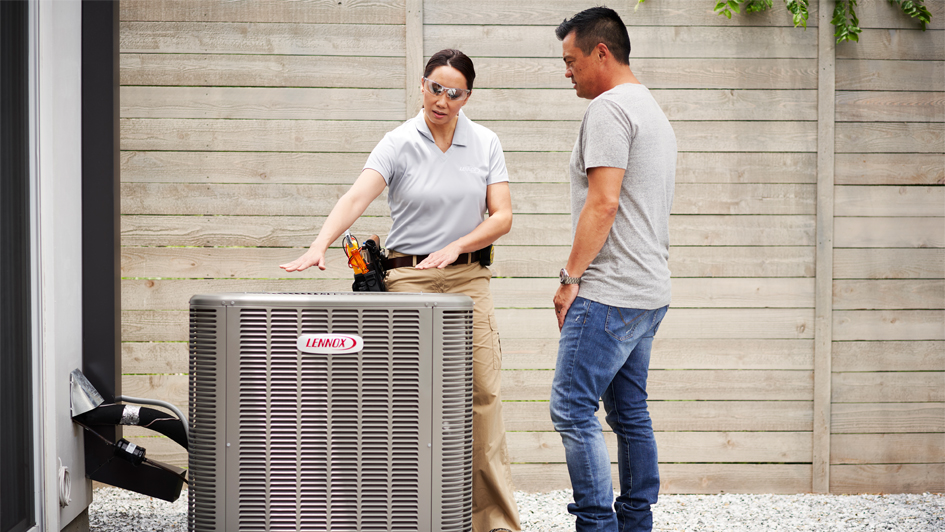
Finding the appropriate HVAC system size for your home is essential. It impacts your comfort and your utility costs. In this HVAC sizing guide, the experts at Bishop Heating & Air Conditioning will explain how to determine the best size of heating and cooling system for your home, what factors they take into account and why choosing the best size HVAC is so important to your convenience.
How Does HVAC System Size Affect Your Home Comfort and Efficiency
Proper HVAC size varies for each home. Your HVAC system needs enough heating and cooling capacity to make your entire home comfortable. It shouldn't have to work extremely hard to keep up in extremely hot or cold weather. However, an HVAC system that's too large is inefficient, increases your energy expenses and can lead to complications that make your home less agreeable.
Crucial Features Professionals Consider for HVAC Sizing in Bishop, CA
To determine the right HVAC system size for a home, the HVAC installation experts at Bishop Heating & Air Conditioning conduct a Manual J load calculation to determine how many British Thermal Units (BTUs) are necessary to heat and cool and the home. A Manual J calculation evaluates several factors, such as:
- Size of the home: The total area of the home is arguably the most significant factor in selecting the size of your HVAC system. How much space will your new HVAC system have to heat and cool?
- Amount of insulation: A well- insulated home maintains the indoor temperature better, which can affect how much heating and cooling capacity you require.
- Regional Climate: The local climate in Bishop, CA, has a significant role in determining the correct size HVAC. Homes in sunnier climates might need a system with a higher cooling capacity, while milder regions may require less.
- Window size: Windows can be a major source of energy loss. The number, dimensions, type of glass used, and whether they’re single or double paned can greatly influence heating and cooling requirements.
- Amount of sun: A home that receives a lot of sunlight will inherently be warmer than one that doesn't, which affects central air sizing. Positioning in relation to prevailing winds and number of nearby shade trees also affect the correct HVAC size.
Most Common DIY HVAC Size Mistakes
A frequent mistake homeowners make when choosing the size of home HVAC system is to focus only on square footage. Although the square footage of your home has a significant impact on what size HVAC you need, other elements also influence how much heating and cooling capacity is required to keep your home comfortable.
Another typical mistake is not hiring a professional. It's essential to have an experienced HVAC technician conduct a Manual J calculation, which takes all the essential aspects of your home into consideration to establish the correct HVAC size.
Why Does HVAC System Size Matter?
An inadequately sized system can lead to comfort problems and increase expenses. Here's a closer look at the pitfalls of a wrong-sized HVAC:
Problems with HVAC systems that are too small:
- Less longevity and breakdowns: HVAC systems that don't have enough power often run constantly to attempt to regulate the temperature of a home, leading to increased wear and tear. This can result in breakdowns and even require premature HVAC replacement.
- An uncomfortable home: Small HVAC systems don't have enough power to heat and cool your entire living space, which can result in hot, stuffy rooms or areas of your home that are uncomfortably cold.
- Higher energy expenses: An underpowered HVAC system that works constantly trying to keep up uses more energy, running up your monthly power bills and costing you money. A properly sized and energy-efficient HVAC system consumes less energy and helps to lower your monthly bills.
Oversized HVAC system problems
- Wasted money: Larger HVAC systems are usually more costly, so purchasing more heating and cooling capacity than your home needs is an avoidable expense.
- Reduced lifespan and breakdowns: HVAC systems that are excessively large often start and stop frequently, referred to as short cycling. This can result in wear and tear on your machine, reducing its service life or requiring HVAC repair.
- Excessive indoor humidity: An HVAC system should regulate indoor humidity, but an oversized HVAC system may lack adequate runtime to accomplish that task. This can cause indoor air quality issues, such as mold growth.
Get the Right HVAC System Size by Working With the Pros at Bishop Heating & Air Conditioning
Now that you have learned some of the aspects of your home that affect what HVAC system size is right for you, it's time to select a new heating and cooling system. Bishop Heating & Air Conditioning can help.
We’ll evaluate your home and provide you with a free, no-obligation estimate for HVAC installation. We’ll evaluate your home to find the most suitable HVAC system size for you, so you can have a comfortable home every day of the year.
Call 760-938-9833 today to schedule your free estimate for HVAC installation in Bishop, CA.
